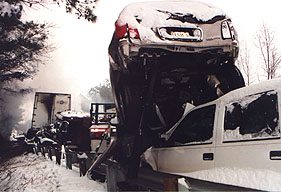High Alert Institute
One Great Solution for Improving Healthcare Preparedness

Our nation faces two interesting challenges when it comes to the healthcare response to disasters. The first is that according to an Institute of Medicine report published in June 2006, hospitals have by and large failed to meet even the most basic standards for disaster preparedness. In other words, they have failed to develop relationships within their own communities, ignoring even EMS and community-wide Emergency Response Services thus failing to integrate these critical services into the hospital disaster plan.
Further, most hospitals, now six years after 9/11, still fail to provide basic disaster response training to all of their employees. Basic Incident Command training that would allow their employees and care providers to integrate themselves into the community-wide response, while required by federal guidelines, is still reserved for members of the administrative team. Most hospitals have even failed to hold or participate in community-wide Disaster Drills despite a four-year-old mandate for these drills each year. Although the reasons cited by hospitals for their failure are many, they are also largely invalid. Requirements have existed for such Community-Wide Disaster Drill since 2003 and since 2002, the federal government had paid for or provided free-of-charge educational opportunities for hospital employees. Unfortunately now, most of that federal funding has ended, the five-year grants have expired.
There is however one opportunity for the federal government to use existing assets, augmented by existing state government assets, to provide not only training but disaster drill opportunities to hospitals and other portions of healthcare. The Natural Disaster Medical System (NDMS) has within its ranks Disaster Medical Assistance Teams (DMAT) who are trained in all aspects of incidents command, disaster vulnerability analysis, disaster planning, disaster response, and disaster recovery. Individuals who make up DMAT teams are civilian healthcare professionals who, when not deployed by our federal government, function as unpaid reservers, part-time federal employees on stand-by status, receiving no pay while remaining on call and ready to deploy within two hours in the event of national disaster or terrorism.
DMAT teams represent the perfect opportunity for the federal government to utilize an asset already in the federal budget to provide not only training to hospitals in the communities surrounding a DMAT team but community-wide, externally designed, and graded disaster drills that would include not only the hospitals but fire rescue, law enforcement, local county and even state emergency operations integrated with state and federal disaster response assets in coordinated community-wide drills. In other words, the best possible practice model.
Expanding the services offered by DMAT teams to their surrounding communities would also serve the objectives of the federal government by providing an opportunity for DMAT teams to hold Field Training Exercises (FTXs) and to network with healthcare assets in the surrounding communities. NDMS has sought for years to develop a network of participating hospitals that would accept patients from distant field disaster sites transported by military or other assets and requiring hospitalization outside of the disaster zone.
The average hospital will spend between $90,000 – 180,000 per year in the coming decade just for disaster drills and training, and this does not include the cost of paying employees to participate in those drills and training opportunities. Participation in federally sponsored federally funded, DMAT based disaster training and exercises would represent a significant inducement to hospitals to join the NDMS hospital system and a significant benefit to NDMS member hospitals.
State medical response teams, known under various names in various locations, could provide a similar opportunity for the state to both build relationships between their teams and their communities as well as improve the operational efficiency of teams through exercises and education.
Conceivably, even Medical Reserve Core units (MRC) could participate by providing local leadership and coordination efforts for their hospitals and communities as the MRC provides the earliest possible disaster response, providing for healthcare needs in those initials hours after an event.
Certainly, there will be the challenges of Congressional funding and special interest groups claiming that the federal government is subsidizing programs that benefit for-profit hospitals. More importantly, however, a program such as this would ensure that our healthcare infrastructure was maximally prepared for the next Hurricane Katrina, for the next Oakridge earthquake, for the next Americas Georgia tornados, for the next great river flood. NDMS member hospitals deserve to receive some benefit for becoming an NDMS hospital and assuming the additional responsibilities that come, uncompensated, with agreeing to participate in America’s disaster healthcare response system. Using DMAT teams to train, drill, and evaluate America’s healthcare infrastructure will ensure that the survivors of disaster receive the best healthcare available while the rest of us rest assured that our community’s healthcare is truly prepared if the disaster comes to our doorstep.
High Alert Institute
4800 Ben Hill Trail
Lake Wales, FL 33898
Office: 863.696.8090
FAX: 407.434.0804
EIN: 27-5078437
Info@HighAlertInstitute.org
Privacy Policy
Cookie Policy
Terms of Use
Disclaimers
Get Your Data
Shipping Policy
Message Us
Transparency
Registrations
Do Not Sell Info
Return Policy
A COPY OF THE OFFICIAL REGISTRATION AND FINANCIAL INFORMATION MAY BE OBTAINED FROM THE DIVISION OF CONSUMER SERVICES BY CALLING TOLL-FREE, WITHIN THE STATE, 1-800-435-7352 (800-HELP-FLA), OR VISITING www.FloridaConsumerHelp.com. REGISTRATION DOES NOT IMPLY ENDORSEMENT, APPROVAL, OR RECOMMENDATION BY THE STATE. Florida Registration #CH68959
REGISTRATION WITH A STATE AGENCY DOES NOT CONSTITUTE OR IMPLY ENDORSEMENT, APPROVAL OR RECOMMENDATION BY THAT STATE.









